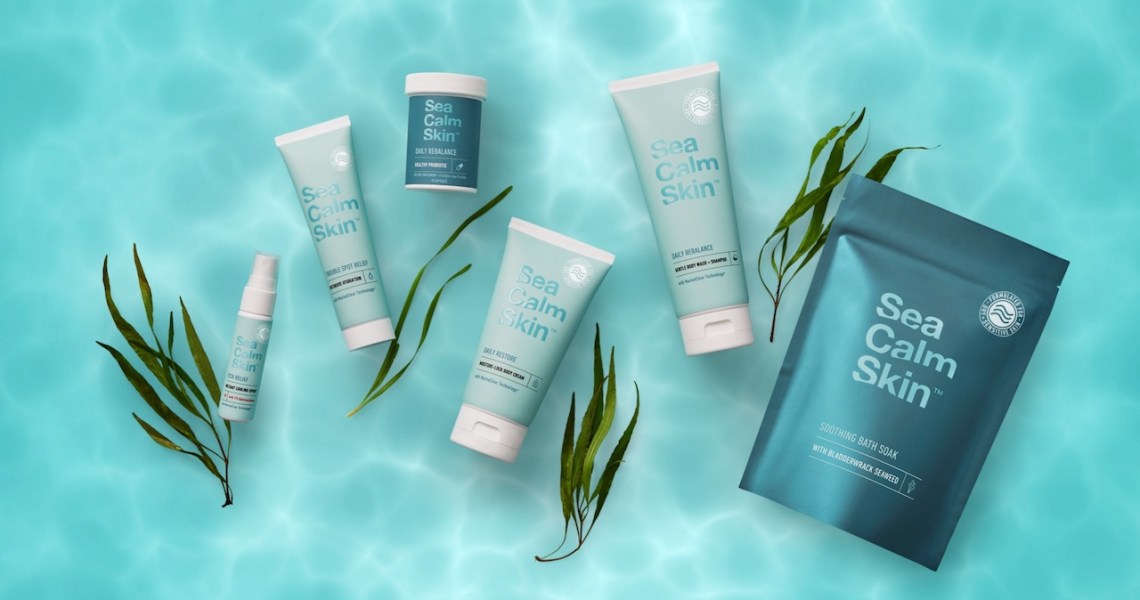Direct marketing company Guthy Renker continues to make moves in beauty.
On Thursday, Guthy Renker, which incubated brands like Proactiv acne line and Wen hair brand, launched its latest joint venture dubbed Sea Calm Skin, a clean, sensitive skin-care line of six products, with benefits for customers with mild psoriasis and eczema. Though Guthy Renker is known for its television infomercials when incubating the aforementioned brands, Sea Calm Skin will be online-only via its direct-to-consumer site. It will launch with Amazon on Aug. 25.
“We feel like we are filling a white space and creating a system of care for people suffering with psoriasis and eczema, which is a significant segment of the population,” said Sea Calm Skin founder Adam Grossman. According to the National Eczema Association, nearly 32 million Americans (or 10% of the population) suffer from the skin condition, and 8 million have psoriasis, per the National Psoriasis Foundation.
While Guthy Renker and Sea Calm Skin would not disclose the joint terms or the new brand’s sales structure, Lauren Hoffman, Sea Calm Skin’s vp of brand marketing, said Guthy Renker’s history of promoting founders (as with Proactiv and Rodan and Fields’ founders Katie Rodan and Kathy A. Fields, and more recently with Cindy Crawford and Meaningful Beauty) and expertise in marketing drew the two companies together. “Adam has worked on the product formulations with our team of scientists and is responsible for the products being efficacious, but Guthy Renker is known to scale businesses,” she said. “They have the acumen to provide investment and marketing support in a very competitive beauty market, which new brands don’t always have.”
Sea Calm Skin is a spin-off brand of Grossman’s other beauty company, Seaweed Bath Co., which launched in 2010 and is sold in more than 7,000 Whole Foods, Target and Wegmans stores. Grossman said that although Seaweed Bath Co. shares similar ingredients with Sea Calm Skin and both offer an ocean-forward proposition, the former did not end up having a sensitive-skin customer. Additionally, he said he is focused on riding the current DTC wave and wants the brand to be online-only.
Like Guthy Renker’s past projects, namely Proactiv, Sea Calm Skin’s offering will be sold in subscription bundles that start at about $50 (for a one-month supply) and go up to approximately $210 (for a three-month offering).
“For psoriasis and eczema sufferers, the best way to combat irritation is to follow a system and use products on a consistent basis,” said Grossman. Depending on the severity of their condition, sufferers look to topical corticosteroids, whether prescription options or over-the-counter, like those from Aveeno. Other prescription treatments include oral medications and light therapy.
Still, since fully or partially offloading some of its beauty businesses — in 2016, Guthy Renker sold a majority stake of Proactiv to Nestlé, for example — the 31-year-old private company still had to settle an $8.5 million lawsuit in February involving auto-renewal payments for Wen and Proactiv products. Sea Calm Skin will be offering individual products for purchase on its website and on Amazon at a premium price point, said Hoffman.
As such, the brand’s primary marketing levers are not infomercials but rather paid social and SEO ads, as well as paid beauty and lifestyle influencer deals with 15 influencers who have suffered or spoken up about psoriasis or eczema in the past. Denise Attico (234,000 Instagram followers) and Sam Robinson (55,200 Instagram followers) are a few of its launch partners, and Hoffman said the company hopes to work with more influencers in the coming months. She would not detail Sea Calm Skin’s marketing or influencer spend.
“We are taking a fully digitally-centric approach here and want to be DTC-first to understand our customer and what he or she needs,” said Hoffman. “We have the advantage of knowing who our customer is and what they are struggling with, so we aren’t trying to be all things to all people. Paid social is still relevant and targeted, where something like out-of-home campaigns would not really make sense here.”




